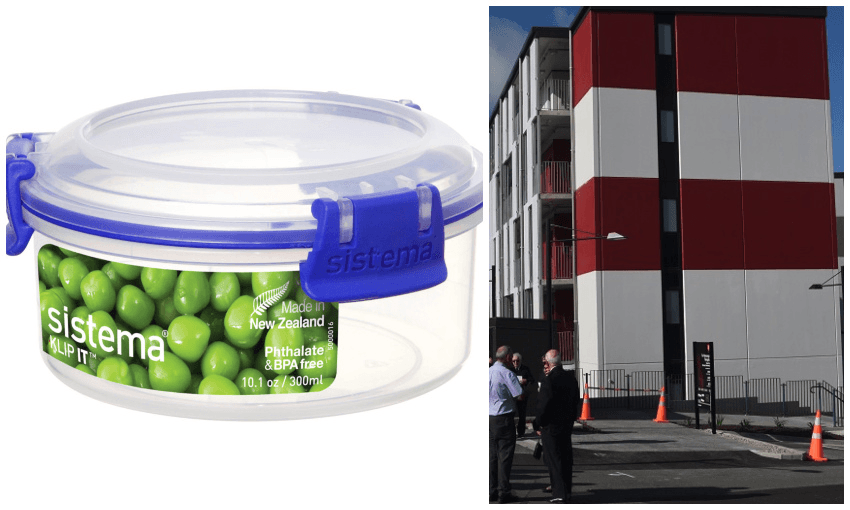Jo and Brendan Lindsay made millions out of plastic lunch boxes and now they are figuring out how to give back to the New Zealand that fostered their good fortune.
If there is a downside to selling your company for $660 million it is that people think you’ve suddenly been transformed into an altruistic ATM.
“It’s incredible some of the requests that come through,” says Jo Lindsay. “Mind-boggling,” adds her husband Brendan. “Sometimes people feel that if they’ve made a bad business decision that we should help them through that moment.”
The Linsdays founded and built Sistema, maker of those addictive plastic food containers with the clever accessories and the click-clack sides. After 30 years in business the couple got their pay day in 2016 when US Fortune 500 company Newell Brands came calling and offered them a multi-million dollar deal.
The sale put them on the Rich List and thrust them reluctantly into the public eye. “Most people had never heard of us until that moment,” Brendan Lindsay says. “We were involved in lots of philanthropic things before then, but now it’s a little bit different, and people see you as very wealthy individuals. We can’t help that, because we have done very well.”
The Lindsays’ latest effort is a $5m investment in Community Finance, a new initiative offering low cost finance to social housing providers. Community Finance’s first project is a $40m bond lent to the Salvation Army at 2.99% to fund 118 new homes for people in the most need. The contribution from the Lindsays’ charitable organisation the Lindsay Foundation is the largest, but they have also been joined by the Tindall Foundation, The Wilberforce Foundation, Christian Savings, and the Matua Charitable Trust as investors in the bond.
The idea is to offer the community housing sector a more affordable alternative to the commercial interest rates charged by the banks. The government wants to increase the number of social housing units to cope with the unprecedented 13,000 families currently on the housing waiting list, and its goal is to have 30% of those homes delivered by community housing providers, Community Finance general manager Paul Gilberd says. “But funding settings do not allow them to proceed at scale,” he says.
The Salvation Army is rising to the challenge by building as many homes as it can, and the first of its planned 118 is the 50-unit Te Hononga Tāngata development which opened in Auckland’s Royal Oak in December. There were 700 referrals for these 50 places, an indication of the demand out there, social housing national director Greg Foster says. Next in its construction queue are 22 units at Westgate in the city’s northwest, due to be finished by April, and another 46 units at Flatbush in the east where earthworks have just started. “As we get access to capital we will keep building,” Foster says.
The Lindsays are chuffed to be at the cutting edge of a new mechanism for dealing with the housing crisis, and they are encouraging other high net worth people to step up and do their bit for New Zealand. “It’s not for us to say ‘come with us’, it’s to say ‘we’re doing this, what are you going to do?’,” Brendan Linsday says.
“A lot of New Zealanders when they make a lot of money leave our country, avoid paying tax, go and do this and that. We want the opposite. I had a free education, we used to have bottles of milk at school, we had free dental, free medical. We love our country, we want to live in our country, and we want to give something back.”
The Lindsays say they’re having to learn how to be philanthropists, and have been talking to others involved in charitable giving including the Green family which runs the Hugh Green Foundation established by their self-made immigrant father, Business Hall of Famers Léonie and John Hynds who built Hynds Pipe Systems, Trade Me founder Sam Morgan, and New Zealand-born businessman Chris Liddell who is currently deputy chief of staff in the Trump White House.
The Lindsays still have business interests but any money they make goes into their charitable foundation. “We don’t need to increase our wealth, we’ve got plenty,” Brendan says. “We’ve also made a firm commitment to our family that when we go, we have no intentions of leaving all our money to the children, it’s just too much. So we’re putting things in place to make sure it’s a legacy that can continue.”
Weeding out the door-knockers notwithstanding – “we have a guy who’s taken on that role, to just shield everything and push forward what he things would suit us,” Jo says – the Lindsays are always on the lookout for causes that interest them. Another recent one they have funded is K9 MD, a charity training dogs to detect diseases such as prostate and bowel cancer. They are also helping the Starship air ambulance after Jo saw a tv programme about the service that “just got my heart”.
It’s easier to empathise when you’ve come from humble beginnings, and they’ve both been extremely lucky, the couple says. Jo and her four siblings would get themselves off to school while their parents were out working on the family’s New South Wales dairy farm. Brendan, also one of five children, is from working class parents in Pukerua Bay and left school at 15.
“We know what it’s like to sit at the dining room table thinking about what’s the next meal,” he says. “Jo and I have got involved in quite a few bits and pieces which we’ve had a tremendous amount of personal enjoyment out of. The point is, we know we’ve made a difference somewhere along the line, rather than squander the opportunity we’ve got which is to put something back into the community.”
